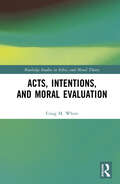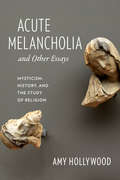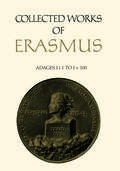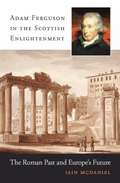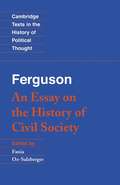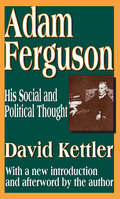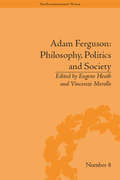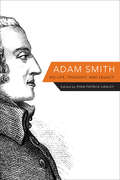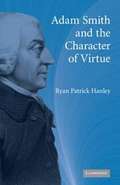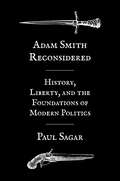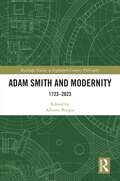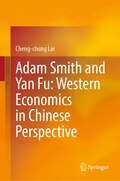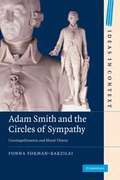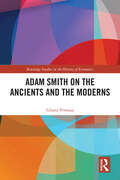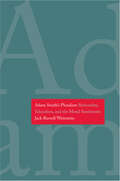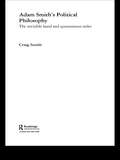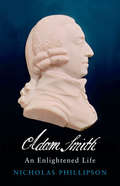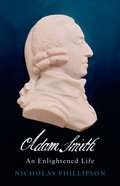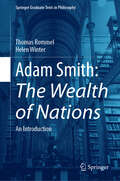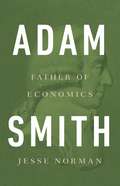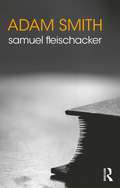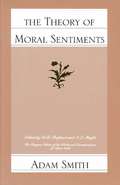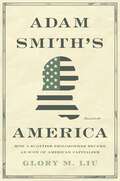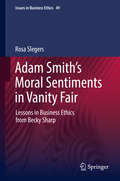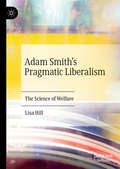- Table View
- List View
Acts, Intentions, and Moral Evaluation (Routledge Studies in Ethics and Moral Theory)
by Craig M. WhiteThis book argues that the moral quality of an act comes from the agent’s inner states. By arguing for the indispensable relevance of intention in the moral evaluation of acts, the book moves against a mainstream, "objective" approach in normative ethics. It is commonly held that the intentions, knowledge, and volition of agents are irrelevant to the moral permissibility of their acts. This book stresses that the capacities of agency, rather than simply the label "agent," must be engaged during an act if its moral evaluation is to be coherent. The author begins with an ontological argument that an act is a motion or a causing of change in something else. He argues that the source of an act’s moral meaning is in the agent: specifically, what the agent, if aware of relevant facts around her, aims to accomplish. He then moves to a series of critical chapters that consider arguments for mainstream approaches to act evaluation, including Thomson’s dismissal of the agent knowledge and volition requirements, Scanlon’s arguments for a derivative relevance of intentions to permissibility, Frowe’s "causal roles" of agents in the moral evaluation of acts, and Bennett’s explicit defense of the objective approach. The book concludes by offering the author’s preferred replacement for the objective approach, an Aristotelian-Thomist view of acts. Acts, Intentions, and Moral Evaluation will be of interest to scholars and advanced students working in ethics, just war theory, the ethics of self-defense, and philosophy of action.
Acute Melancholia and Other Essays: Mysticism, History, and the Study of Religion (Gender, Theory, and Religion)
by Amy HollywoodAcute Melancholia and Other Essays deploys spirited and progressive approaches to the study of Christian mysticism and the philosophy of religion. Ideal for novices and experienced scholars alike, the volume makes a forceful case for thinking about religion as both belief and practice, in which traditions marked by change are passed down through generations, laying the groundwork for their own critique. Through a provocative integration of medieval sources and texts by Jacques Derrida, Judith Butler, Talal Asad, and Dipesh Chakrabarty, this book redefines what it means to engage critically with history and those embedded within it.
Adages: Ii1 to Iv100
by Desiderius Erasmus Margaret Mann Phillips R.A.B. MynorsErasmus' Adagia has been called 'one of the world's biggest bedside books,' and certainly the more than 4000 proverbs and maxims gathered and commented on by Erasmus, sometimes in a few lines and sometimes in full-scale essays, have great appeal for both scholar and educated layman. The aim of the Adages was to recapture, in this handy portmanteau form, the outlook and way of life of the classical world through its customs, legends, and social institutions, and to put within reach of a modern public the accumulated wisdom of the past. Each adage is traced in the works of as many authors as Erasmus had to hand; always an authority is given (usually several) and often a close reference providing chapter and verse. The commentaries in the Adages give a forthright and often eloquent expression of Erasmus' opinions on the world of his day, dovetailing with his satirical works on the one hand and his popular evangelical writings on the other. Many, if not most, of the proverbs cited by Erasmus are still in our common stock of speech today. The Collected Works of Erasmus is providing the first complete translation of Erasmus' Adagia. This volume contains the initial 300 adages with notes that identify the classical sources and indicate how Erasmus' reading and thinking developed over the quarter-century spanned by the eight revisions of the original work. Volume 31 of the Collected Works of Erasmus series.
Adam Ferguson in the Scottish Enlightenment
by Iain McdanielAlthough overshadowed by his contemporaries Adam Smith and David Hume, the Scottish philosopher Adam Ferguson strongly influenced eighteenth-century currents of political thought. A major reassessment of this neglected figure, Adam Ferguson in the Scottish Enlightenment: The Roman Past and Europe’s Future sheds new light on Ferguson as a serious critic, rather than an advocate, of the Enlightenment belief in liberal progress. Unlike the philosophes who looked upon Europe’s growing prosperity and saw confirmation of a utopian future, Ferguson saw something else: a reminder of Rome’s lesson that egalitarian democracy could become a self-undermining path to dictatorship. Ferguson viewed the intrinsic power struggle between civil and military authorities as the central dilemma of modern constitutional governments. He believed that the key to understanding the forces that propel nations toward tyranny lay in analysis of ancient Roman history. It was the alliance between popular and militaristic factions within the Roman republic, Ferguson believed, which ultimately precipitated its downfall. Democratic forces, intended as a means of liberation from tyranny, could all too easily become the engine of political oppression-a fear that proved prescient when the French Revolution spawned the expansionist wars of Napoleon. As Iain McDaniel makes clear, Ferguson’s skepticism about the ability of constitutional states to weather pervasive conditions of warfare and emergency has particular relevance for twenty-first-century geopolitics. This revelatory study will resonate with debates over the troubling tendency of powerful democracies to curtail civil liberties and pursue imperial ambitions.
Adam Ferguson: An Essay On The History Of Civil Society
by Fania Oz-Salzberger Adam FergusonAdam Ferguson's Essay on the History of Civil Society (first published in 1767) is a classic of the Scottish - and European - Enlightenment. Drawing on such diverse sources as classical authors and contemporary travel literature, Ferguson offers a complex model of historical advance which challenges both Hume's and Smith's embrace of modernity and the primitivism of Rousseau. Ferguson combines a subtle analysis of the emergence of modern commercial society with a critique of its abandonment of civic and communal virtues. Central to Ferguson's theory of citizenship are the themes of conflict, play, political participation and military valour. The Essay is a bold and novel attempt to reclaim the tradition of active, virtuous citizenship and apply it to the modern state.
Adam Ferguson: His Social and Political Thought
by David KettlerThe thought of Adam Ferguson generated great excitement among many of his philosophic contemporaries in the late eighteenth century, and it continues to inspire the modern reader. This major study by David Kettler is an ideal introduction to Ferguson's life and thought. The new introduction to this first paperback edition discusses Ferguson's work in relation to his better-known contemporaries David Hume and Adam Smith, while the afterword offers an in-depth reconsideration of Ferguson's most renowned work, An Essay on the History of Civil Society, with emphasis on present-day disputes about the concept of civil society. Ferguson welcomed the advent of critical and analytical philosophy as an ally against superstitious credulity and confused obscurantism, but he was afraid that it might also dissolve into incomprehensible technical complexity and ethical relativism. He was attracted by the manifest practical accomplishments of modern science, as well as by its masterful ordering of natural phenomena into a unified theoretical structure, but he feared that its adherents would debase the notion of man to that of a machine at the mercy of mechanical forces. Ferguson thought well of ambition, but he also believed that a frenzy of ambition and frustration might tear at man's self-respect and peace of mind. The decisive phenomenon manifested by Ferguson's writing is the emergence of an intellectual's point of view toward the conditions of modern society. Many of the questions that he posed have been restated in more profound ways, some of the questions and most of the answers have been eliminated or transformed beyond recognition; and all of the issues he raises are now expressed by others in harsh, new words. But, however formulated, Ferguson's concerns clearly foreshadow the problems of over-rationalization, dehumanization, atomization, alienation, and bureaucratization that have been repeatedly canvassed by intellectuals in our time.
Adam Ferguson: Philosophy, Politics And Society (The Enlightenment World #8)
by Eugene HeathUnique among the leading figures of the Scottish Enlightenment, Ferguson saw two eighteenth-century revolutions, the American and the French. This monograph contains a set of essays that analyse Ferguson's philosophical, political and sociological writings and the discourse which they prompted between Ferguson and other important figures.
Adam Smith
by Ryan Patrick HanleyAdam Smith (1723-90) is perhaps best known as one of the first champions of the free market and is widely regarded as the founding father of capitalism. From his ideas about the promise and pitfalls of globalization to his steadfast belief in the preservation of human dignity, his work is as relevant today as it was in the eighteenth century. Here, Ryan Hanley brings together some of the world's finest scholars from across a variety of disciplines to offer new perspectives on Smith's life, thought, and enduring legacy.Contributors provide succinct and accessible discussions of Smith's landmark works and the historical context in which he wrote them, the core concepts of Smith's social vision, and the lasting impact of Smith's ideas in both academia and the broader world. They reveal other sides of Smith beyond the familiar portrayal of him as the author of the invisible hand, emphasizing his deep interests in such fields as rhetoric, ethics, and jurisprudence. Smith emerges not just as a champion of free markets but also as a thinker whose unique perspective encompasses broader commitments to virtue, justice, equality, and freedom.An essential introduction to Adam Smith's life and work, this incisive and thought-provoking book features contributions from leading figures such as Nicholas Phillipson, Amartya Sen, and John C. Bogle. It demonstrates how Smith's timeless insights speak to contemporary concerns such as growth in the developing world and the future of free trade, and how his influence extends to fields ranging from literature and philosophy to religion and law.
Adam Smith And The Character Of Virtue
by Ryan Patrick HanleyRecent years have witnessed a renewed debate over the costs at which the benefits of free markets have been bought. This book revisits the moral and political philosophy of Adam Smith, capitalism's founding father, to recover his understanding of the morals of the market age. In so doing it illuminates a crucial albeit overlooked side of Smith's project: his diagnosis of the ethical ills of commercial societies and the remedy he advanced to cure them. Focusing on Smith's analysis of the psychological and social ills endemic to commercial society - anxiety and restlessness, inauthenticity and mediocrity, alienation and individualism - it argues that Smith sought to combat corruption by cultivating the virtues of prudence, magnanimity, and beneficence. The result constitutes a new morality for modernity, at once a synthesis of commercial, classical, and Christian virtues and a normative response to one of the most pressing political problems of Smith's day and ours. Ryan Patrick Hanley is Assistant Professor of Political Science at Marquette University. His research in the history of political philosophy has appeared in the American Political Science Review, the American Journal of Political Science, the Review of Politics, History of Political Thought, the European Journal of Political Theory, and other academic journals and edited volumes. He is also the editor of the forthcoming Penguin Classics edition of Adam Smith's Theory of Moral Sentiments, featuring an introduction by Amartya Sen, and a co-editor, with Darrin McMahon, of The Enlightenment: Critical Concepts in History.
Adam Smith Reconsidered: History, Liberty, and the Foundations of Modern Politics
by Paul SagarA radical reinterpretation of Adam Smith that challenges economists, moral philosophers, political theorists, and intellectual historians to rethink him—and why he mattersAdam Smith has long been recognized as the father of modern economics. More recently, scholars have emphasized his standing as a moral philosopher—one who was prepared to critique markets as well as to praise them. But Smith&’s contributions to political theory are still underappreciated and relatively neglected. In this bold, revisionary book, Paul Sagar argues that not only have the fundamentals of Smith&’s political thought been widely misunderstood, but that once we understand them correctly, our estimations of Smith as economist and as moral philosopher must radically change.Rather than seeing Smith either as the prophet of the free market, or as a moralist who thought the dangers of commerce lay primarily in the corrupting effects of trade, Sagar shows why Smith is more thoroughly a political thinker who made major contributions to the history of political thought. Smith, Sagar argues, saw war, not commerce, as the engine of political change and he was centrally concerned with the political, not moral, dimensions of—and threats to—commercial societies. In this light, the true contours and power of Smith&’s foundational contributions to western political thought emerge as never before.Offering major reinterpretations of Smith&’s political, moral, and economic ideas, Adam Smith Reconsidered seeks to revolutionize how he is understood. In doing so, it recovers Smith&’s original way of doing political theory, one rooted in the importance of history and the necessity of maintaining a realist sensibility, and from which we still have much to learn.
Adam Smith and Modernity: 1723–2023 (Routledge Studies in Eighteenth-Century Philosophy)
by Alberto BurgioThis volume features 19 original essays on Adam Smith’s conception of modernity. The contributions demonstrate the relevance of Smith as the great interpreter of modernity 250 years after the publication of The Wealth of Nations. The chapters in Part 1 focus on structural aspects of Smith’s work. They cover topics such as Smith as theorist of spontaneous order, the systematic dimension of Smith’s theoretical construction, and Smith’s role as a historian of economic thought. Part 2 addresses Smith’s conception of modern subjectivity between Lectures on Rhetoric and Belles-Lettres, Theory of Moral Sentiments and Wealth of Nations. Here the contributors consider the figure of the Smithian "merchant" and the importance of ridicule and satire for understanding modern civility, and comment on the role of sympathy, imagination and moral judgement in developing a sense of self, the condition of the modern man in society, and the virtue of self-command. Part 3 focuses on the crucial question of the relationship between ethics and economics discussing the link between efficiency, equity and justice, the nature of Smith's theory of value, and the ethical connotation of Smith's critique. Part 4 deals with topics inherent to the functional dynamics and development process of the Smithian "commercial society". These topics include law and authority, the relationship between work and freedom, the parable of the "poor man’s son", and the economic and political consequences of the new secular orthodoxy. Finally, the chapters in Part 5 explore themes related to history and the Smithian idea of progress. They focus on the link between trade and progress of civilization, Smith’s modern sociological vision of mass commercial societies, Smith's judgment on “savage” and premodern societies, and the controversial question of the immanentistic or providentialist perspective from which Smith considers both the social dynamics and the historical process. Adam Smith and Modernity will appeal to scholars and advanced students on 18th-century philosophy, the history of economic thought, and the history of social and political philosophy.
Adam Smith and Yan Fu: Western Economics in Chinese Perspective
by Cheng-chung LaiThis book examines at a static level how Adam Smith's The Wealth of Nations (1776) was introduced into China at the turn of the twentieth century. In a dynamic socio-economic context, Yan Fu (1854-1921) had The Wealth of Nations in mind as a prescription for China's "Wealth and Power". This book aims answer the question of whether The Wealth of Nations, a book which advocates laissez-faire, free trade, and minimum governance helpful for China with very different economic conditions and modes of thought to the West and goes on to reexamine Yan Fu's economic ideas through a modern economics perspective.
Adam Smith and the Circles of Sympathy: Cosmopolitanism and Moral Theory
by Fonna Forman-BarzilaiA broad-ranging study of Smith's views on moral judgement, humanitarian care, commerce, justice and international law.
Adam Smith on the Ancients and the Moderns (Routledge Studies in the History of Economics)
by Gloria VivenzaThe classics heavily influenced many aspects of European modern culture, yet it is not easy to trace their intellectual power on any author. In this volume, Gloria Vivenza takes on the impressive task of examining how philosophy, history, literature, politics, and ethics all played a part in shaping Adam Smith’s thought as a scholar, philosopher, and economist.This book will be of interest to advanced students and researchers in the history of economic thought, the history of philosophy, moral philosophy, political theory, and the Enlightenment.
Adam Smith's Pluralism
by Jack Russell WeinsteinIn this thought-provoking study, Jack Russell Weinstein suggests the foundations of liberalism can be found in the writings of Adam Smith (1723#150;1790), a pioneer of modern economic theory and a major figure in the Scottish Enlightenment. While offering an interpretive methodology for approaching Smith's two major works, The Theory of Moral Sentiments and The Wealth of Nations, Weinstein argues against the libertarian interpretation of Smith, emphasizing his philosophies of education and rationality. Weinstein also demonstrates that Smith should be recognized for a prescient theory of pluralism that prefigures current theories of cultural diversity.
Adam Smith's Political Philosophy: The Invisible Hand and Spontaneous Order (Routledge Studies in Social and Political Thought #Vol. 42)
by Craig SmithWhen Adam Smith published his celebrated writings on economics and moral philosophy he famously referred to the operation of an 'invisible hand'. Adam Smith’s Political Philosophy makes visible this hand by examining its significance in Smith’s political philosophy and relating it to similar concepts used by other philosophers, thus revealing a distinctive approach to social theory that stresses the importance of the unintended consequences of human action. The first book to examine the history of Smith’s political philosophy from this perspective, this work introduces greater conceptual clarity to the discussion of the invisible hand and the related notion of unintended order in the work of Smith, as well as in political theory more generally. By examining the application of spontaneous order ideas in the work of Smith, Hume, Hayek and Popper, this important volume traces similarities in approach, and from these constructs a conceptual, composite model of an invisible hand argument. While setting out a clear framework of the idea of spontaneous order, the book also builds the case for using this as an explanatory social theory, with chapters on its application in the fields of science, moral philosophy, law and government.
Adam Smith: An Enlightened Life
by Nicholas Phillipson'The Smith who emerges from this thoughtful study is not the modern caricature. He is, rather, a man of his times, steeped in Enlightenment culture . . . he had an intellect of extraordinary brilliance, and it is the life of that intellect that is finely portrayed in this book' Noel Malcolm, Sunday Telegraph Adam Smith is celebrated as the author of the Wealth of Nations And The founder of modern economics. Yet Smith saw himself primarily as a philosopher rather than an economist, whose life's work was to establish a grand 'Science of Man', which was unfinished on his death and was one of the greatest projects of the European Enlightenment. Providing a radical new account of Smith's life And The intellectual ferment that gave rise to his ideas, this is a surprising and compelling portrait of one of the greatest minds of his age. 'A wonderful, thought-provoking book' Robert Skidelsky'A great achievement . . . Few books have shed better light on what Smith 'meant' and why he wrote as he did . . . it also sets out a richly informed account of the intellectual life in Scotland, London And The Continent at the time' Bill Jamieson, Scotland on Sunday 'Shows Smith was not the apostle of selfishness he is often misunderstood to be . . . Phillipson has portrayed an Adam Smith for our times' Diane Coyle, New Statesman
Adam Smith: An Enlightened Life
by Nicholas PhillipsonAdam Smith is celebrated all over the world as the author of The Wealth of Nations and the founder of modern economics. A few of his ideas - that of the 'Invisible Hand' of the market and that 'It is not from the benevolence of the butcher, the brewer, or the baker that we expect our dinner, but from their regard to their own interest' - have become icons of the modern world. Yet Smith saw himself primarily as a philosopher rather than an economist, and would never have predicted that the ideas for which he is now best known were his most important. This book, by one of the leading scholars of the Scottish Enlightenment, shows the extent to which The Wealth of Nations and Smith's other great work, The Theory of Moral Sentiments, were part of a larger scheme to establish a grand 'Science of Man', one of the most ambitious projects of the European Enlightenment, which was to encompass law, history and aesthetics as well as economics and ethics.Nicholas Phillipson reconstructs Smith's intellectual ancestry and formation, of which he gives a radically new and convincing account. He shows what Smith took from, and what he gave to, the rapidly changing and subtly different intellectual and commercial cultures of Glasgow and Edinburgh as they entered the great years of the Scottish Enlightenment. Above all he explains how far Smith's ideas developed in dialogue with those of his closest friend, the other titan of the age, David Hume. This superb biography is now the one book which anyone interested in the founder of economics must read.
Adam Smith: An Introduction (Springer Graduate Texts in Philosophy)
by Helen Winter Thomas RommelThis textbook provides an accessible introduction to Adam Smith, one of the most important economic thinkers. His seminal work The Wealth of Nations is a classic text in philosophy, social sciences and economics. This introduction puts Smith&’s central ideas on the division of labour, the invisible hand and the market into context. A careful analysis of key passages from Smith&’s writings explains how he arrived at a theory of society and the market that has become central to our understanding of human motives. The discussion of Smith&’s The Wealth of Nations is followed by sources from the 18th century that shaped Smith&’s analysis of human motives and propensities. This introduction is indispensable reading for an informed discussion of the mechanisms that govern human society. It provides an introduction to Adam Smith as one of the most astute thinkers of the 18th century, whose ideas shape modern concepts of the market, making it ideal as course material in courses such as economics, history, political sciences, sociology, literary studies, philosophy.
Adam Smith: Father of Economics
by Jesse NormanA dazzlingly original account of the life and thought of Adam Smith, the greatest economist of all time Adam Smith (1723-1790) is now widely regarded as the greatest economist of all time. But what he really thought, and the implications of his ideas, remain fiercely contested. Was he an eloquent advocate of capitalism and individual freedom? A prime mover of "market fundamentalism"? An apologist for human selfishness? Or something else entirely? In Adam Smith, political philosopher Jesse Norman dispels the myths and caricatures, and provides a far more complex portrait of the man. Offering a highly engaging account of Smith's life and times, Norman explores his work as a whole and traces his influence over two centuries to the present day. Finally, he shows how a proper understanding of Smith can help us address the problems of modern capitalism. The Smith who emerges from this book is not only the greatest of all economists but a pioneering theorist of moral philosophy, culture, and society.
Adam Smith: The Adam Smith Review, Volume 5: Essays Commemorating The 250th Anniversary Of The Theory Of Moral Sentiments (The Routledge Philosophers #5)
by Samuel FleischackerAdam Smith (1723–1790) is widely regarded as one of the great thinkers of the Enlightenment period. Best-known for his founding work of economics, The Wealth of Nations, Smith engaged equally with the nature of morality in his Theory of Moral Sentiments. He also gave lectures on literature and jurisprudence, and wrote papers on art and science. In this outstanding philosophical introduction Samuel Fleischacker argues that Smith is a superb example of the broadly curious thinkers who flourished in the Enlightenment—for whom morality, politics, law, and economics were just a few of the many fascinating subjects that could be illuminated by naturalistic modes of investigation. After a helpful overview of his life and work, Fleischacker examines the full range of Smith’s thought, on such subjects as: epistemology, philosophy of science, and aesthetics the nature of sympathy moral approval and moral judgement virtue religion justice and jurisprudence governmental policy economic principles liberalism. Including chapter summaries, suggestions for further reading, and a glossary, Adam Smith is essential reading for those studying ethics, political philosophy, the history of philosophy, and the Enlightenment, as well as those reading Smith in related disciplines such as economics, law, and religion.
Adam Smith: The Theory of Moral Sentiments
by Adam Smith D. D. Raphael A. L. MacfieMan's moral nature is influenced by sentiment and sympathy. The human ability to sympathize forms the psychological basis of man's desire to adhere to natural moral laws. Adam Smith explores ideas about individual freedom and self-interest, conscience and virtue, and a classic work of moral philosophy that remains relevant.
Adam Smith’s America: How a Scottish Philosopher Became an Icon of American Capitalism
by Glory M. LiuThe unlikely story of how Americans canonized Adam Smith as the patron saint of free marketsOriginally published in 1776, Adam Smith&’s The Wealth of Nations was lauded by America&’s founders as a landmark work of Enlightenment thinking about national wealth, statecraft, and moral virtue. Today, Smith is one of the most influential icons of economic thought in America. Glory Liu traces how generations of Americans have read, reinterpreted, and weaponized Smith&’s ideas, revealing how his popular image as a champion of American-style capitalism and free markets is a historical invention.Drawing on a trove of illuminating archival materials, Liu tells the story of how an unassuming Scottish philosopher captured the American imagination and played a leading role in shaping American economic and political ideas. She shows how Smith became known as the father of political economy in the nineteenth century and was firmly associated with free trade, and how, in the aftermath of the Great Depression, the Chicago School of Economics transformed him into the preeminent theorist of self-interest and the miracle of free markets. Liu explores how a new generation of political theorists and public intellectuals has sought to recover Smith&’s original intentions and restore his reputation as a moral philosopher.Charting the enduring fascination that this humble philosopher from Scotland has held for American readers over more than two centuries, Adam Smith&’s America shows how Smith continues to be a vehicle for articulating perennial moral and political anxieties about modern capitalism.
Adam Smith’s Moral Sentiments in Vanity Fair: Lessons in Business Ethics from Becky Sharp (Issues in Business Ethics #49)
by Rosa SlegersAccording to Adam Smith, vanity is a vice that contains a promise: a vain person is much more likely than a person with low self-esteem to accomplish great things. Problematic as it may be from a moral perspective, vanity makes a person more likely to succeed in business, politics and other public pursuits. “The great secret of education,” Smith writes, “is to direct vanity to proper objects:” this peculiar vice can serve as a stepping-stone to virtue. How can this transformation be accomplished and what might go wrong along the way? What exactly is vanity and how does it factor into our personal and professional lives, for better and for worse?This book brings Smith’s Theory of Moral Sentiments into conversation with William Makepeace Thackeray’s Vanity Fair to offer an analysis of vanity and the objects (proper and otherwise) to which it may be directed. Leading the way through the literary case study presented here is Becky Sharp, the ambitious and cunning protagonist of Thackeray’s novel. Becky is joined by a number of other 19th Century literary heroines – drawn from the novels of Jane Austen, Charlotte Brontë and George Eliot – whose feminine (and feminist) perspectives complement Smith’s astute observations and complicate his account of vanity. The fictional characters featured in this volume enrich and deepen our understanding of Smith’s work and disclose parts of our own experience in a fresh way, revealing the dark and at times ridiculous aspects of life in Vanity Fair, today as in the past.
Adam Smith’s Pragmatic Liberalism: The Science of Welfare
by Lisa HillAdam Smith is commonly conceived as either an economist or a moral philosopher so his importance as a political thinker has been somewhat neglected and, at times, even denied. This book reveals the integrated, deeply political project that lies at the heart of Smith’s thought, showing both the breadth and novelty of Smith’s approach to political thought. A key argument running through the book is that attempts to locate Smith on the left-right spectrum (however that was interpreted in the eighteenth century) are mistaken: his position was ultimately dictated by his social scientific and economic thought rather than by ideology or principle. Through examining Smith’s political interests and positions, this book reveals that apparent tensions in Smith's thought are generally a function of his willingness to abandon, not only proto-liberal principles, but even the principles of his own social science when the achievement of good outcomes was at stake. Despite the common perception, negative liberty was not the be-all and end-all for Smith; rather, welfare was his main concern and he should therefore be understood as a thinker just as interested in what we would now call positive liberty. The book will uniquely show that Smith’s approach was basically coherent, not muddled, ad hoc, or ‘full of slips’; in other words, that it is a system unified by his social science and his practical desire to maximise welfare.
